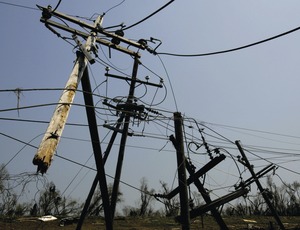
The threat of climate change, a rising sea level and increased storm surge are not news to those who work in Port Fourchon. There, at the southern tip of Louisiana, the oil and gas companies that serve 18% of the oil and gas platforms in the Gulf of Mexico know what to do when hurricanes approach: They secure their storm-resilient buildings, raise their equipment and then abandon the island to Mother Nature until the surge recedes and they can return.
Port Fourchon is not the only energy facility vulnerable to a changing climate. In the U.S., there are 328 high-value energy facilities—such as refineries and powerplants—less than five feet above local high-tide levels. Many floodwalls have been built to protect these assets. But in Louisiana during last year's Hurricane Isaac, the levee wasn't high enough to protect the Alliance Refinery in Belle Chasse.
Further, climate change will affect pipelines. The Trans-Alaska Pipeline, for example, was built on permafrost that is now melting.
As evidenced by New York City's flooded substations and underground lines during Superstorm Sandy, electric infrastructure is also at risk. New York City has 90,000 miles of underground power cables and 10 powerplants located within its one-in-100-year flood zone. Across the country, powerplants are also at risk because their water sources are becoming less reliable; drought makes water supplies scarce, and record temperatures make water too hot for effective cooling.
The adaptation challenge for the energy sector is "enormous," says Tom Wilbanks of the Oak Ridge National Laboratory. But there's reason for optimism, he says, because many energy companies are adaptation leaders.
Louisiana-based Entergy Corp. is among them. A 2009 report from the utility makes the case that climate-change measures can protect the entire Gulf Coast. "Doing nothing is not an acceptable plan," said Entergy CEO Wayne Leonard. "That's a plan to put Entergy out of business, a plan for misery and suffering for our customers, and a plan that would devastate a region already economically impaired."
Last year, for the first time, oil and gas companies met in London to talk about adaptation measures.

Post a comment to this article
Report Abusive Comment